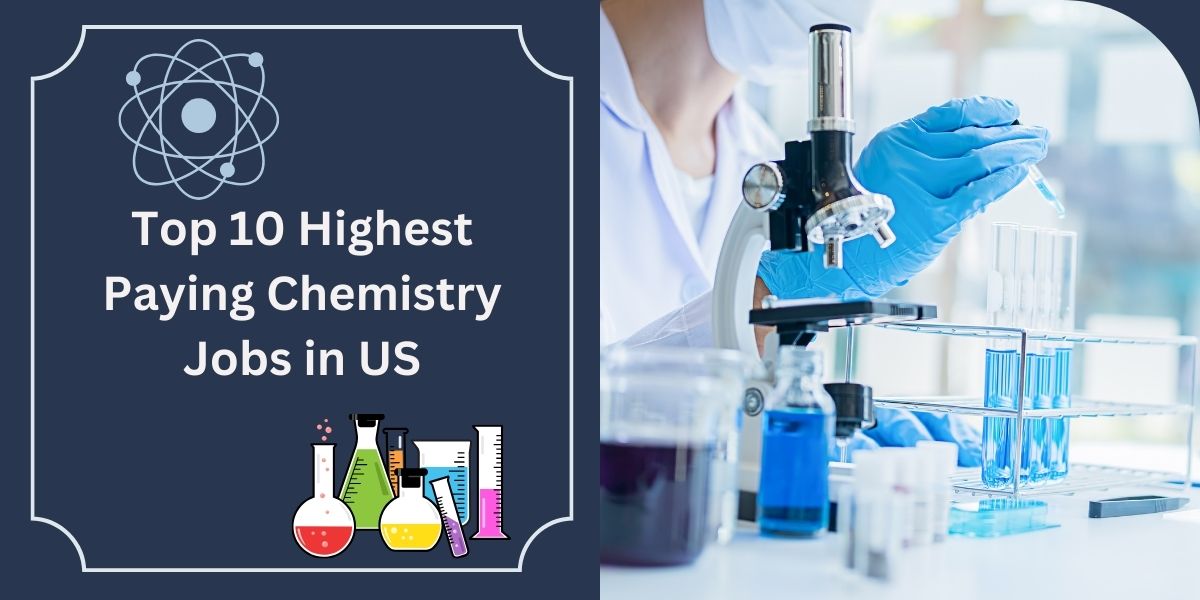A chemistry degree allows you to pursue a variety of occupations in science, research, business, and healthcare. Knowing the highest-paying chemistry jobs in the US might help you reap the benefits of making a good living while working in a field that fascinates you.
Employers may engage you to conduct laboratory tests, combine chemical compounds, and evaluate scientific data if you have a chemistry degree.
This article looks at the top 10 highest-paying chemistry jobs in the USA. Read on to learn more.
What are the highest-paying chemistry jobs in the US?
1. Industrial Chemist
Annual salary range: $42,500–$75,000
An industrial chemist is one of the highest-paying chemistry jobs in the USA.
Chemical engineers and industrial chemists work together to transfer chemical research advances into mass-produced commodities. Improving chemical manufacturing technologies, methodologies, materials, and processes is one of your tasks. This job necessitates education, work experience, and specialized abilities.
A bachelor’s degree in chemistry or a closely related discipline, as well as lab experience, are required. The position necessitates analytical problem-solving abilities as well as the ability to collaborate with others.
2. Cosmetic Chemist
Annual salary range: $50,000-$73,500
Another of the highest-paying chemistry jobs in the USA is cosmetic chemistry.
Cosmetic chemists research or develop cosmetics such as skin care, toothpaste, colors, soaps, and makeup. Their responsibilities may include material research, developing and testing new compounds, and preparing technical reports. Their mission is to better understand and improve product chemical composition.
3. Analytical Chemist
Annual salary range: $52,000-$71,500
A scientist who does analytical chemistry experiments in a laboratory for various purposes is known as an analytical chemist. As an analytical chemist, you will supervise investigations to establish how chemical substances interact.
Under the supervision of an experienced research chemist, you could calibrate instruments and collect data in an entry-level position. The data must be accurately captured to produce the best results. This is standard research in the pharmaceutical, food, petroleum, and environmental science industries.
4. Biochemist
Annual salary range: $44,000–$68,000
A biochemist plans and executes applied and basic biochemical research projects, prepares technical reports, recommendations, and publications, and communicates findings to colleagues, engineers, and other scientists in diagnosing ailments, diseases, and genetic disorders.
Their findings help to improve medical treatments and procedures. They also manage lab teams, research the impact of chemicals on organisms, and discover, analyze, and produce DNA, proteins, and enzymes.
5. Chemist
Annual salary range: $45,500-$66,500
Chemists manipulate matter to uncover complex molecules’ components and create entirely new chemical substances. They are striving to comprehend every aspect of the specific chemistry.
Biochemists research chemical interactions at the cellular level within living creatures to develop everything from DNA therapies to pharmaceutical drugs. Neurochemists specialize in studying molecules, neurochemicals, and other biological nervous system components.
6. Quality Control Chemist
Annual salary range: $45,500-$64,500
A quality control chemist (QC chemist) is a type of laboratory chemist who measures and tests lab materials and products in line with industry-specific standard procedures. Pharmaceutical and manufacturing jobs are both typical.
As a QC chemist, you ensure all federal legislation and safety standards are followed. Some QC chemists are in charge of calibrating and maintaining lab equipment and performing stringent quality assurance on samples.
7. Inorganic Chemist
Annual salary range: $37,500–$61,000
Inorganic chemists are scientists who study the properties of inorganic chemical compounds such as metals and minerals.
Your responsibilities include:
- Taking samples.
- Investigating molecules, chemicals, and mixtures with specialist equipment.
- Creating highly complex analyses of your findings.
In most cases, you’ll work in a lab, conducting studies to determine the safety and suitability of substances or materials.
8. Nuclear Chemistry Technician
Annual salary range: $39,000–$58,000
Nuclear chemistry technicians are chemists or scientists who have studied nuclear chemistry. Nuclear chemistry technicians are primarily employed in nuclear energy or manufacturing plants, assisting engineers, physicists, and other industry professionals with plant operations or nuclear research.
As part of the work, special equipment may be employed to assess power generation and radiation levels. They may collect and test water, soil, and air samples for contamination using specialized equipment.
9. Wet Chemistry Analyst
Annual salary range: $37,000-$55,500
Working with chemical substances in a lab setting is one of the responsibilities of a wet chemistry analyst. Typical responsibilities include collecting samples, interpreting data, and documenting or reporting outcomes.
This field is known as “wet chemistry” because most research methods require you to work with chemical elements in liquid form (such as those found in beakers). A postgraduate degree, as well as relevant experience, are essential.
10. Associate Chemist
Annual salary range: $44,000–$54,000
An assistant chemist in a chemistry lab conducts material analysis, chemical tests, and other research investigations under the supervision of a lead chemist or a more senior researcher.
Your tasks and responsibilities will differ based on where you work. Associate chemists work in pharmacies, pharmaceutical manufacturing, medical research and development, industrial production, and oil and gas exploration and refining.
Depending on the profession, you may have specialized requirements related to expertise, such as forensic chemistry or inorganic chemistry.
Tips for Getting the Highest-Paying Chemistry Jobs
Here are a few tips that may help you get a high-paying chemistry job:
Research
Look at the highest-paying companies and chemistry careers in your area of expertise. Learn about the credentials needed for the various positions listed. This may give you a better understanding of the lucrative career opportunities accessible in the labor market, which may help you get the high-paying job you want.
Depending on your career, you may have unique requirements connected to expertise, such as forensic chemistry or inorganic chemistry.
Make improvements
It is vital to be purposeful in your skill-set development. You can do this by learning new skills, volunteering for extra jobs to gain more employment experience, and gaining an advanced chemistry degree or professional certification in your specialization.
Your CV displays these expanded skills, which may help you land the highest-paying chemical positions.
Network
Attending reputable seminars, webinars, and conferences where you can network with people with the highest-paying chemistry jobs will help you expand your professional contact list. You can also become an active member of online groups or forums for professionals in your field by creating articles and constantly commenting on the platforms.
This may help you build professional contact with someone who can recommend you for a profitable job in your field of interest.
Be relevant
If individuals in your business know you are very talented in a specific area, employers may contact you directly about job opportunities in their organization.
You can boost your credibility in chemistry science by undertaking regular research to seek new ideas or answers. Another way to stay relevant in your field is to get publications about your discoveries published in well-known journals.
Conclusion
You can now use the knowledge of the highest-paying chemistry jobs to pursue a lucrative and fascinating career in chemistry in the USA. There is something for everyone in chemistry, from synthetic chemistry to inorganic chemistry to analytical chemistry.




 Jobi.ng
Jobi.ng

